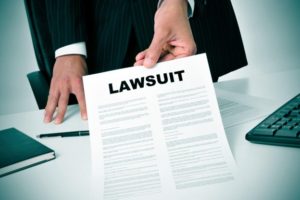 Stockbrokers, insurance agents, and other professionals may have a professional duty to disclose certain information to their customers or clients. If they fail to disclose this required information, they may find themselves on the receiving end of a lawsuit. This is just one example of how someone may find themselves filing or being served with a lawsuit. While many legal matters are resolved out of court through a settlement, there are steps in a lawsuit every client should know. There may be some variations to these steps depending on the specific area of law, and not every case will involve the services of an attorney –– but in general, when legal matters are handled by attorneys, these professionals follow a similar series of steps in every case. If you would like to learn more or need help dealing with an Arizona lawsuit, consider contacting Harrison Law, PLLC for help by calling (480) 320-2310.
Stockbrokers, insurance agents, and other professionals may have a professional duty to disclose certain information to their customers or clients. If they fail to disclose this required information, they may find themselves on the receiving end of a lawsuit. This is just one example of how someone may find themselves filing or being served with a lawsuit. While many legal matters are resolved out of court through a settlement, there are steps in a lawsuit every client should know. There may be some variations to these steps depending on the specific area of law, and not every case will involve the services of an attorney –– but in general, when legal matters are handled by attorneys, these professionals follow a similar series of steps in every case. If you would like to learn more or need help dealing with an Arizona lawsuit, consider contacting Harrison Law, PLLC for help by calling (480) 320-2310.
Investigation
Regardless of the type of law involved, any attorney will investigate the case to determine the circumstances before suggesting any action, including filing or responding to a lawsuit. Depending on the facts found, the investigation stage may preclude the necessity of going further, and this preliminary step may result in potential litigants, or their counsel, determining not to go forward with the filing process, as well as informing a defendant’s response. This investigation will depend on the specific circumstances, but it may involve:
- Reviewing contracts and other documents related to the dispute
- Reading emails, letters, memos, and other communications regarding the matter
- Interviewing witnesses who know facts relevant to the case
- Reviewing any legal complaints and other public records
After conducting this investigation, the lawyer is in a better place to explain the client’s legal options, and they may be able to devise a strategy in the case, including whether a lawsuit is warranted, or whether there are other options that may help resolve the case.
Pleadings
Pleadings are one of the most important steps in a lawsuit because they represent the first step in a formal lawsuit. According to the Judicial Branch of Arizona in Maricopa County, pleadings include the complaint lodged against the plaintiff explaining their allegations against the defendant, as well as the summons which notifies the defendant of the legal action taken against them.
The defendant in a civil case has 20 days after being served with the summons to respond to the complaint by filing their answer, also included as a form of pleading under the Arizona Judicial Branch’s Rules of Civil Procedure.
Discovery
After a lawsuit is filed, the parties can engage in the discovery process. Discovery allows both parties to collect information relevant to the case as they prepare for trial. Attorneys tend to place a high value on the discovery process because the facts they are able to obtain at this stage help to structure the recommendations they make to clients as they develop their legal strategy. There are many different discovery requests that can be made during discovery.
Interrogatories
Interrogatories are the lists of questions the parties send to each other. Interrogatories commonly seek answers to questions about matters such as:
- Identifying information about the parties and any witnesses they plan to call
- Whether the opposing party plans to call an expert witness, and the credentials offered by that witness
- The other party’s position or arguments they plan to make
- The evidence they plan to introduce at trial
- Facts regarding the case
Requests for Production of Documents
Requests for production of documents are often submitted along with inventories that ask the other party to provide copies of all of the documents listed therein. These documents may include contracts, bills, invoices, receipts, and written communications. Written communications may include handwritten documents, as well as copies of emails, private messages on social media, and text messages.
Requests for Admissions
Requests for admissions try to narrow the scope of the case. They ask the other party to specifically admit or deny certain facts. These admissions must be made under oath. These requests are often made to simplify uncontested issues and make the trial faster and less expensive for all involved. If the other party acknowledges the truth of the requested facts, they do not need to be proven in court.
Subpoenas
A subpoena orders someone with information about the case to produce certain evidence, or to appear in order to testify, either at a deposition or during trial. Subpoenas are typically issued to witnesses or people other than the parties directly involved in the case.
Depositions
Depositions are question-and-answer sessions in which the questioned individuals are placed under oath. These sessions are documented by a court reporter and may also be subject to audio and/or visual recording. Depositions are often a preview of the testimony that will be made during the trial, but are frequently not considered admissible in court. Sometimes, however, they may be used to discredit a witness who says one thing during the deposition and another during the trial.
Negotiation or Mediation
Negotiation, or sometimes an alternative called mediation, is the step in which the parties attempt to resolve, or settle, the case without going to trial. This step can take place at any point in the litigation process but is sometimes precipitated by information obtained during discovery. In this step, one or both parties will suggest a settlement. In mediation, a neutral third party will listen to both parties and try to help them reach a settlement. Negotiation is very similar, but usually does not involve a third party. Negotiation is usually handled between the two parties, with one making an offer and the other either accepting, declining, or making a counteroffer.
Negotiation or mediation will last either until the parties reach a settlement or until one or both parties concludes that it is not possible to reach a settlement and that going to trial is the only way to resolve the issue. If you believe negotiation may help you avoid a lawsuit, Harrison Law PLLC may be able to assist you in negotiating with the other party.
Pre-Trial Conference
One or more pre-trial conferences may be scheduled to ensure the court is kept aware of the status of the case and that the case progresses through the court system. During these conferences, the court may resolve any pending motions, and may further encourage the parties to try to negotiate a settlement so a trial would not be necessary.
Trial
If the parties are unable to agree to a settlement, the case proceeds to trial. Trial includes many distinct steps of its own, including:
- Voir dire – Voir dire is the process of interviewing witnesses in a jury trial to determine if they are competent to testify, or potential jurors to uncover any hidden biases. The lawyers can lodge a challenge against the inclusion of some potential jurors if their responses during the voir dire process suggest they may be unable to objectively evaluate the case.
- Opening statements – Each party provides an opening statement in which they present their side of the case and give a brief overview of the evidence they plan to introduce to prove their side of the case. The process typically begins with the plaintiff.
- Examination of witnesses – The plaintiff usually begins by calling witnesses to testify under oath regarding their knowledge of the case. The plaintiff, or their attorney, may also present evidence that the witnesses authenticate during this process.
- Cross-examination of witnesses – After the plaintiff questions each witness, the defense will have an opportunity to pose their own questions, in a process known as cross-examination. Only after the plaintiff has concluded their case will the defense call their own witnesses to testify. Those witnesses will similarly be subject to cross-examination.
- Closing statements – At the end of the process, each side summarizes their case and why they think the case should be found in their favor.
Verdict
At the conclusion of the trial, the judge or jury will deliberate on the case and render a verdict. The verdict states in whose favor the court has decided, as well as naming any damages awarded, if applicable.
Appeal
Sometimes the lawsuit process does not end with the verdict issued at the conclusion of the trial. Either of the parties in a civil case may have the right to file an appeal, although they typically must be able to show some legal grounds for doing so, rather than citing simply their own dissatisfaction with the verdict. The higher court is generally limited to reviewing the record for errors the lower court made that affected the outcome of the case, so if a lawsuit moves to an appeal this step will not typically involve the presentation of new evidence not heard in the original trial.
Contact an Experienced Lawyer for Assistance in Dealing With a Lawsuit
Familiarizing yourself with all of the steps in a lawsuit can help the process to feel more predictable and less stressful, but it is no substitute for working with experienced legal counsel. The seasoned Arizona business attorneys at Harrison Law, PLLC assist both plaintiffs and defendants with Arizona lawsuits in a variety of practice areas. Contact the firm today by calling (480) 320-2310 to schedule a confidential consultation.
© 2024 Matthew W. Harrison and Harrison Law, PLLC All Rights Reserved
This website and article have been prepared by Harrison Law, PLLC for informational purposes only and does not, and is not intended to, constitute legal or financial advice. The information is not provided in the course of an attorney-client relationship and is not intended to substitute for legal advice from an attorney licensed in your jurisdiction.






